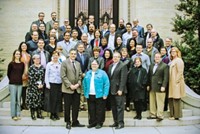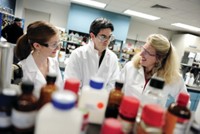Advertisement
Grab your lab coat. Let's get started
Welcome!
Welcome!
Create an account below to get 6 C&EN articles per month, receive newsletters and more - all free.
It seems this is your first time logging in online. Please enter the following information to continue.
As an ACS member you automatically get access to this site. All we need is few more details to create your reading experience.
Not you? Sign in with a different account.
Not you? Sign in with a different account.
ERROR 1
ERROR 1
ERROR 2
ERROR 2
ERROR 2
ERROR 2
ERROR 2
Password and Confirm password must match.
If you have an ACS member number, please enter it here so we can link this account to your membership. (optional)
ERROR 2
ACS values your privacy. By submitting your information, you are gaining access to C&EN and subscribing to our weekly newsletter. We use the information you provide to make your reading experience better, and we will never sell your data to third party members.
Careers
'Advance'-ing Women
NSF-funded program is catalyzing systemic transformations of women in academia
by CELIA M. HENRY, C&EN WASHINGTON
March 8, 2004
| A version of this story appeared in
Volume 82, Issue 10

In one of his songs, Bob Dylan wrote that "the times, they are a-changin'." No offense to Dylan, but many women in the ranks of science and engineering professors think that the times haven't changed quickly enough. Although the number of women receiving doctoral degrees in scientific fields has greatly increased, the representation of women in leadership positions within the academic community has not kept pace.
Often in discussions about the advancement of women, the focus is placed on individual women. But one program funded by the National Science Foundation shifts the focus from individuals to institutions and how they can improve the situation. The program was a response to evidence that the representation of women at the full professor level had not increased over several decades.
Known as Advance, it replaced a program known as POWRE, for Program Opportunities for Women in Research & Education, which funded individual women. "We were asked to review POWRE and what it had accomplished and to think about additional approaches that might be needed, such as looking at the institutional factors that inhibit women's advancement," said Alice Hogan, director of the NSF Advance program.
"I think about this as an investment issue," Hogan said. "It's managing the investment that [the U.S.] has made in educating women to the Ph.D. [level]."
But talking about such issues can be difficult, especially if there's a lot of resistance. "We wanted to provide a safe opportunity for people to talk about the issue--that is, provide cover for discussion," Hogan said. "These are issues that people generally don't want to raise. It's difficult to discuss collegially because people get instantly polarized."
NSF LAUNCHED the Advance program in 2001 with eight five-year grants awarded in October of that year. Since then, a total of 18 institutional grants have been awarded, with another pending. These multi-million-dollar grants have ranged from just under $3 million to nearly $6 million.
At last month's meeting of the American Association for the Advancement of Science (AAAS), in Seattle, representatives from institutions that received grants in the first round of funding described the programs they've implemented, the challenges they've faced, and the lessons they've learned.
One potentially surprising aspect of the programs that have been implemented through the Advance grants is that they are less about gender than about how institutions can be more effective. For example, "everybody should know what's necessary to get tenure," Hogan said at the meeting. "It shouldn't be a big mystery."
Georgia Institute of Technology is one of the universities that received an Advance grant. As part of the program, the institute has established an Advance professorship in each of the four colleges covered by the grant, said Sue V. Rosser, dean of Ivan Allen College at Georgia Tech and coprincipal investigator of the grant. Each professorship is intended for a female full professor, whose major responsibility under the grant is to develop a mentoring network for women faculty. For example, the Advance professors host lunches and other events to bring the women in their schools together.
Georgia Tech has especially focused on issues surrounding tenure and promotion. A faculty committee was established to determine whether subtle biases in the areas of gender and race had unintentionally crept into the tenure and promotion process. They did an overview of the procedures and policies for tenure and promotion within the individual colleges and departments. The committee took its task seriously and even had what amounted to "mini-courses in women's studies and ethnic studies," Rosser told C&EN. "They have developed a very interesting tool which will eventually be available on the Web. It's a kind of game that helps faculty understand subtle biases."
Several of the schools have established policies to help faculty navigate short-term crises in their lives. At Georgia Tech, professors can apply to have their duties temporarily modified to deal with family situations, including the birth of a child or caring for a sick spouse or parent. For example, if a professor's workload is usually divided into 40% research, 40% teaching, and 20% service, that split might be adjusted to 80% research and 20% service. "That would be a way to give a person the flexibility he or she needs to cope with a relatively short-term life crisis," Rosser said.
At the University of Washington, Seattle, a program provides resources to professors going through "transition periods" so they don't "fall off the tenure track," said Denice D. Denton, dean of the College of Engineering. "We leave it open to the applicants to let us know what they think they need."
Georgia Tech and the University of Michigan both offer policies that allow a delay of tenure review. Georgia Tech had to team up with the University of Georgia, which is not an Advance institution, to persuade the board of regents of the university system of Georgia to allow them to implement the stop-the-clock policy.
The University of Washington found that it particularly needed to work on recruitment issues, according to Denton. Professors aren't educated in human resources, she said, and they have a history of thinking of recruitment as a filtering process. She sees this filter analogy as a negative model that "doesn't send the right message." Instead, she likes to think of the university as a magnet that is trying to attract the best people, which requires extending the search to the whole population, not just a subset.
"If we're not out there recruiting the whole panoply of people that goes beyond the white males, then we're leaving a tremendous amount of talent outside the University of Washington," she said. "When you're doing fund-raising, you talk about leaving money on the table because you didn't 'make the ask.' If you're not out there looking at everybody, you're going to leave brains on the table."
To combat these problems, the university developed a "recruitment tool kit" that provides basic information on how to conduct searches. "There's a lot of good, basic nuts-and-bolts information in there on how to do an effective and proactive search to identify diverse and excellent candidates," Denton said. In addition, Washington reduced the number of search committees to one per department, which helped make the hiring process within each department more uniform.
Because effective leaders are essential to the success of these initiatives, a number of the schools established leadership development programs. The University of Washington holds quarterly workshops for department chairs and college deans and associate deans. Georgia Tech holds mini-retreats that bring together the senior leadership with the women faculty members. The University of Colorado has started a program called LEAP, for Leadership Education for Advancement & Promotion.
"If a program like [Advance] is going to work, you have to address it at the level where hiring is being done and promotion cases are being made," said Herbert P. Killackey, vice provost and coprincipal investigator of the Advance grant at the University of California, Irvine. That means the school has chosen to focus at the department and college level. The university is rather unusual in that six of its 10 deans are women.
Irvine is particularly proud of its program of "equity advisers." Two individuals have been appointed in each of Irvine's 10 colleges. The equity advisers visit faculty search committees and discuss how they should go about recruiting to make sure they have appropriately diverse applicant pools. On a more individual basis, the equity advisers may be involved in coaching tenure or promotion candidates about how they can best present their cases.
When this program was first set up, there were privacy concerns about the access the equity advisers would have to information. To sidestep that issue, the equity advisers have all been appointed as faculty assistants to the dean, thereby making them part of the administration.
As a smaller institution located in a fairly isolated area, New Mexico State University, Las Cruces, faces challenges that many of the other Advance schools don't. "In terms of dealing with what's called the two-body problem, or what we're trying to get people to think of as the two-body opportunity, we have a much greater challenge than those other major institutions," said Lisa M. Frehill, a sociologist and principal investigator on the school's Advance grant. "The other part is that when people reach the associate professor level here, our salaries can't go much further. We're susceptible to having our talented associate professors lured away by those larger institutions." Therefore, New Mexico State has focused on attrition and its flip side, retention.
Successful implementation of the programs requires acceptance at all levels. Programs that come strictly from the upper administration can seem like bureaucratic impositions. Similarly, grassroots efforts will fade without support from the top. "If you do one without the other, it's a very dangerous strategy," Frehill said. "The leadership has to be there, and the people have to feel like what the leadership is asking them to do is consistent with what they think is important."
Georgia Tech made sure it got buy-in from the upper administration by making the provost the principal investigator on the grant. "We were really seeking transformation at the whole institution as opposed to just a college or just a department," Rosser said.
IN CONTRAST, the momentum at Washington came from the bottom up. "We had small workshops with groups of faculty from the affected departments prior to writing the proposal," Denton said. "Through those workshops, the themes emerged of what we needed to focus on."
One of the surprising things that the various universities have found is that men take advantage of some of the new policies as well. Men's participation has helped eliminate stigma from the programs, perhaps making women less reticent about participating.
For these programs to last after the NSF funding runs out, they need to find a permanent home. Georgia Tech addressed that problem before it even wrote the proposal. Once the grant expires, many of the initiatives will be managed by the institute's Center for Studies of Women in Science & Technology program. New Mexico State recently established a position of provost, and many of the Advance programs will wind up in that office, Frehill said. Washington has so far had success in persuading its provost to institutionalize the transitional support program, and Advance's faculty leadership program is serving as the model for a similar program from the university's human resources department, Denton said.
People are anxious for change, but only time will reveal the long-term effects of the Advance programs. Shirley Malcom, one of the panel moderators and head of the Directorate of Education & Human Resources Programs at AAAS, commented that the problem wasn't created overnight and can't be fixed overnight. Similarly, Hogan said people need to be "realistic" in their expectations and "give things time to happen."








Join the conversation
Contact the reporter
Submit a Letter to the Editor for publication
Engage with us on Twitter